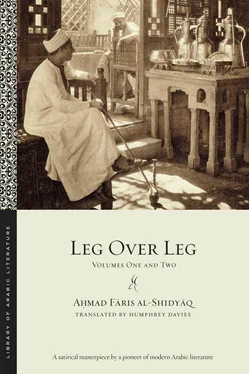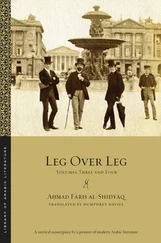436“The Extraction of the Fāriyāq from Alexandria, by Sail” ( Fī-nqīlāʿ al-Fāriyāq min al-Iskandariyyah ): the base sense of inqilāʿ is “to pull up by the roots,” but the references to sailing in the first paragraph indicate that the author is simultaneously implying the concoction of a humorous new sense derived from qilʿ “sail,” which has the same root as inqilāʿ .
437al-Ṣāḥib ibn ʿAbbād: 326–85/938–95, vizier to the Būyid rulers of Iran; the verses evoke such Qurʾanic passages as “And unto Solomon (We subdued) the wind and its raging” (Q Anbiyāʾ 21:81).
438The priest substitutes letters he can pronounce for those he cannot. Thus he says hāʾ ( h ) for ḥ ( ḥāʾ ) as in al-rahmān for al-raḥmān (“the merciful”), for ʿayn ( ʿ ) as in hitābukum for ʿitābukum (“censuring you”), for khāʾ ( kh ) as in al-mihaddah for al-mikhaddah (“the bolster”), and for the glottal stop ( ʾ ) as in rahzan for raʾsan (“resolutely”); hamzah ( ʾ ) for ʿayn ( ʿ ) as in al-ʾālam for al-ʿālam (“the world”); kāf ( k ) for qāf ( q ) as in akūl for aqūl (“I say”), for khāʾ ( kh ) as in akshā for akhshā (“I fear”), and for ghayn ( gh ) as in mashkūl for mashghūl (“busy”); sīn ( s ) for ṣād ( ṣ ) as in nasārā for naṣārā (“Christians”) and for thāʾ ( th ) as in akassir for akaththir (“I repeat often”); dāl ( d ) for ḍād ( ḍ ) as in al-hādirīn for al-ḥāḍirīn (“those present”); tāʾ ( t ) for ṭāʾ ( ṭ ) as in tūlihi for ṭūlihi (“its length”); and zayn ( z ) for dhāl ( dh ) as in lazzāt for ladhdhāt (“pleasures”) and for ẓāʾ ( ẓ ) as in mawhizatī for mawʿiẓatī (“my counsel”); s for th and z for dhāl are also common “errors” of native speakers. Sometimes the same letter is used with different values in the same word as in al-akdak for al-aghdaq (“the most bountiful”), or all the letters in a words are changed, as in al-sukh for al-ṣuqʿ (“the region”). These changes sometimes result in the production of meaningful words (e.g., kalbukum (“your dog”) for qalbukum (“your heart”)) but more often in nonsense, e.g., rahmān and rahīm .
439“the Arabic-language-challenged… Sponging… Aleppine” ( al-Ḥalabī al-Bushkānī… al-Immaʿī… ): names of prominent persons are often followed by a series of attributive adjectives ending in — ī ( nisbah s) indicating pedigree, place of origin, place of residence, legal school, etc.; here only al-Ḥalabī (“of Aleppo”) is a real nisbah ; the rest are made by adding — ī to words associated with gluttony, parasitism, and ignorance of Arabic.
440Metropolitan Atanāsiyūs al-Tutūnjī (or Athanāsiyūs al-Tūtunjī) (d. 1874), Melkite bishop of Tripoli from 1836, was dismissed for scandalous behavior and spent some time in England in the early 1840s seeking to promote union between the Anglican and Eastern churches. The author hated him because he denigrated the translation of the Book of Common Prayer on which the author was then engaged for the Society for the Propagation of Christian Knowledge (SPCK) and suggested that he could do better. He did in fact produce a specimen, which al-Shidyāq saw, whereupon he sent the SPCK (in March 1844) “an Arabic Poem expressing the ungenerous behaviours of the Society for Promotion of Christian Knowledge… in having employed in my stead an ignorant person [i.e., al-Tutūnjī] — not withstanding I have addressed them in two letters respecting the numerous grammatical mistakes he has committed” (letter in English in the Church Missionary Society; I am indebted to Geoffrey Roper for this information); subsequently, the SPCK changed its view and reinstated al-Shidyāq as their translator. The author alludes to this imbroglio and a further spat between him and al-Tutūnjī in Book Three (3.18.1).
441 Al-Ḥakākah fī l-rakākah ( The Leavings Pile Concerning Lame Style ): we have failed to identify the original of the work whose title is parodied here; according to Georg Graf, al-Tutūnjī wrote only on theological and ecclesiastical matters (see Graf, Geschichte , 3:278), but this and further references here (3.5.14, 3.18.1) imply that he was active in the teaching of language and translation.
442“or…”: the Qāmūs continues “to ʿAdawl, a man who used to make the ships, or to a people who used to camp in Hajar.”
443The verse is attributed to ʿAlī ibn al-Jahm (ca. 188–249/804–63).
444“their cousins”: i.e., the Roman Catholic Maltese.
445Khalīl ibn Aybak al-Ṣafadī (d. 764/1363): a litterateur whose works include Lawʿat al-shākī wa-damʿat al-bākī ( The Plaint of the Lovelorn and Tears of the Disconsolate ), which describes the agonies of love.
446“his ‘stable management (of affairs),’ his ‘leadership qualities,’ and his ‘horse sense’” ( al-siyāsah wa-l-qiyādah wa-l-firāsah/farāsah ): the humor lies in the fact that each word has one meaning appropriate to the donkey-boy’s supposed elevated state and another appropriate to his actual occupation; thus siyāsah , whose original sense is “the management of animals” also means “the management of men,” and thence “rule,” while qiyādah originally meant “the leading of horses, or caravans” and thence “command (e.g., of an army)”; firāsah means “horsemanship,” while farāsah (the two forms being indistinguishable in unvowelled writing) means “intuitive perception.”
447 ʿanmī : after the red fruit of the ʿanam (pomegranate) tree.
448[?]: ghurmah , a word not found in the dictionaries.
449Sūrat Nūn: i.e., Sūrat al-Qalam (sura 68), which begins with the initial nūn and is thus appropriate for a nūnah (“cleft in the chin”).
450“I am copying them from one who looked deeply into every veiled face(t)” ( nāqilan lahu ʿamman tabaṣṣara l-wajha l-maḥjūb ): meaning that definitions that the author provides above are those of the author the Qāmūs , who, as a lexicographer, has looked deeply into every facet of the meaning of each word just as, as a man, he has looked deeply into the veiled faces of women ( wajh means both “face” and “facet”).
451“hasn’t seen her as did Our Master Yaʿqūb”: cf. Gen. 29:10–11 “Jacob saw Rachel… and Jacob kissed Rachel.”
452“Professors Amorato…” ( al-Ṣabābātī …): given their form, it is clear that these fictitious but contextually appropriate names are intended to represent scholars, as are those a few lines below.
453“the letter ṣād … the letter mīm ” ( al-ṣādī wa-l-mīmī ): ṣād  was used conventionally, because of its shape, as a coded reference to the vagina and mīm
was used conventionally, because of its shape, as a coded reference to the vagina and mīm  to the anus.
to the anus.
Читать дальше

 was used conventionally, because of its shape, as a coded reference to the vagina and mīm
was used conventionally, because of its shape, as a coded reference to the vagina and mīm  to the anus.
to the anus.










